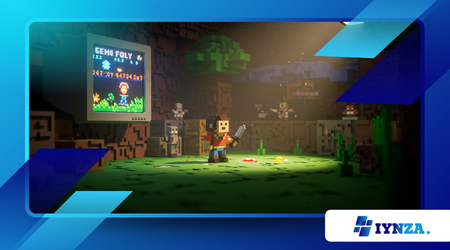How to Emulate Retro Games Legally and Safely

Retro gaming isn’t just about nostalgia—it’s about preserving history. Classic titles from the 80s, 90s, and early 2000s shaped the gaming landscape we know today.
Anúncios
But as older consoles become harder to find and physical media deteriorates, emulation has become the go-to solution for keeping those memories alive. Yet for all its accessibility, many players still wonder: how do you emulate retro games legally and safely in 2025?
It’s not just a matter of downloading the right emulator. Legal and secure emulation requires understanding the laws around game ownership, finding trusted software, and protecting both your device and your data.
This guide walks through each step with care, so you can dive into your favorite classics without risking malware or crossing legal boundaries.
Understanding What’s Legal
Emulation itself is not illegal. Creating or using software that mimics older consoles is perfectly legal in most countries.
The tricky part is the game files—also known as ROMs or ISOs. Downloading a game file you don’t own is where most people break the law without realizing it.
The golden rule: only emulate games you legally own. This typically means you purchased the original cartridge, disc, or digital version.
Backing up your own games using specialized hardware is the safest route. For example, if you own a Game Boy Advance cartridge, tools like the GBxCart RW allow you to dump the ROM legally.
Why is this so important? Because game publishers and rights holders have taken legal action against illegal distribution.
Even Nintendo, historically one of the most aggressive companies on this front, has issued takedown notices and filed lawsuits against ROM-hosting sites. When you stick to what you own, you stay in the clear.
Read also: The Impact of Gaming Subscriptions (Xbox Game Pass, PS Plus) on the Industry
Choosing Safe, Trusted Emulators
Not all emulators are built equally. Some are maintained by dedicated developers who respect legal boundaries, prioritize performance, and keep their code transparent.
Others bundle malware, data mining, or adware under the hood. Downloading from the wrong source can turn a trip down memory lane into a nightmare.
To avoid risk, always use official websites or GitHub repositories when downloading emulators. Popular and trusted options in 2025 include:
- RetroArch – A multi-system emulator that supports dozens of consoles and has active development.
- DuckStation – One of the most accurate PlayStation emulators, designed for both speed and visual fidelity.
- mGBA – A reliable, lightweight emulator for Game Boy Advance with excellent compatibility.
- PPSSPP – Still the gold standard for emulating Sony’s PSP, with great upscaling features.
Before installing, check community reviews, developer updates, and whether the software is open source. Trust isn’t about popularity—it’s about transparency and user support.
Avoiding Malware and Phishing Sites
The number one threat to emulation today is shady websites. Search for a classic game and you’ll find dozens of links offering “free ROMs.” Most of them are either illegal or dangerous.
These sites can inject your device with malware, trick you into giving up personal information, or download ransomware in disguise.
Use a strong antivirus and consider running emulators in a sandbox or virtual machine. But even better—avoid suspicious sites altogether.
Stick with well-moderated communities like r/emulation or trusted archiving projects that operate within legal guidelines. It’s the digital equivalent of shopping from a licensed store rather than a street vendor with no return policy.
Backing Up Your Own Game Library
Let’s say you want to emulate your old Nintendo 64 titles. You own the cartridges, but you want to preserve them digitally.
You can use a device like the Retrode 2, which connects to your PC and allows you to extract ROMs from original cartridges. For discs, tools like the Plextor PX-716 series combined with ImgBurn can help you make legal backups.
Example 1: A retro enthusiast in São Paulo backed up his full Mega Drive collection using a combination of cartridge readers and RetroArch. He now plays his games on a handheld device while his original copies remain stored safely.
Example 2: A collector in Toronto used a PS2 to dump ISO files from her personal game discs, converting her childhood favorites into a digital library she plays on her Steam Deck.
These methods aren’t just legal—they’re sustainable. They allow players to preserve what they’ve paid for and enjoy them without hardware limitations.
Public Domain and Open-Source Games
One way to avoid legal confusion altogether is to explore games that are in the public domain or were released as open-source by their developers.
Many classic PC games, such as the original Doom, have official source ports maintained by fans and even developers themselves. Some consoles also feature homebrew titles that are entirely legal to download and play.
Curious how many are out there? According to the Digital Games Preservation Project, over 1,200 legally free retro-style or open-source games were cataloged and actively maintained by community developers as of early 2025.
These titles provide the retro experience without any legal gray areas. And some, like Cave Story or OpenTTD, offer just as much depth and challenge as their commercial counterparts.
Emulation as Preservation, Not Piracy
There’s a growing understanding that emulation is vital for preserving gaming history.
Physical media breaks down, region-locked content is lost to time, and developers sometimes go out of business. Without emulation, many titles would vanish entirely.
That said, preservation doesn’t justify piracy. Think of emulation as a museum—an effort to honor, not steal.
A gaming historian once compared it to collecting vinyl records: the music matters, but so does respecting the source. You wouldn’t steal records from a store just to preserve jazz.
So how do you stay respectful? Buy used games when possible, support re-releases from official publishers, and keep your backups to your own purchases. This ensures that emulation remains a tool for culture, not a shortcut for theft.
Staying Updated on Regional Laws
Emulation laws vary across countries. In the United States, backing up games you own for personal use is largely protected. In Germany, bypassing DRM—even for backups—is restricted. Brazil, fair use laws are looser, but still murky when it comes to digital content. Always check your local regulations before assuming what’s allowed.
International fans should follow legal analysis from trusted gaming law blogs or advocacy groups like the Video Game History Foundation. Staying informed keeps your actions respectful and your data safe.
Conclusion
Emulating retro games in 2025 can be a rewarding, legal, and safe way to revisit the classics—if you approach it with care.
By sticking to what you own, choosing trusted tools, and steering clear of dangerous downloads, you not only protect yourself but help legitimize a powerful part of gaming culture.
Emulation isn’t about shortcuts—it’s about stewardship. And when done right, it ensures that the games that shaped us remain playable for generations to come.
FAQ
1. Is emulation legal in 2025?
Yes, the act of emulating is legal in most countries. Downloading games you don’t own, however, is not.
2. How do I legally back up my old games?
Use hardware like the Retrode or a disc reader to extract files from your physical cartridges or discs.
3. What’s the safest emulator to use today?
RetroArch is one of the most trusted options, along with DuckStation and PPSSPP, depending on the system you want to emulate.
4. Can I get viruses from emulation sites?
Yes. Many ROM-hosting websites are filled with malware. Always download from official or community-verified sources.
5. Are there legal retro games I can play for free?
Yes, many open-source and public domain games are available legally and can be played without restriction.
